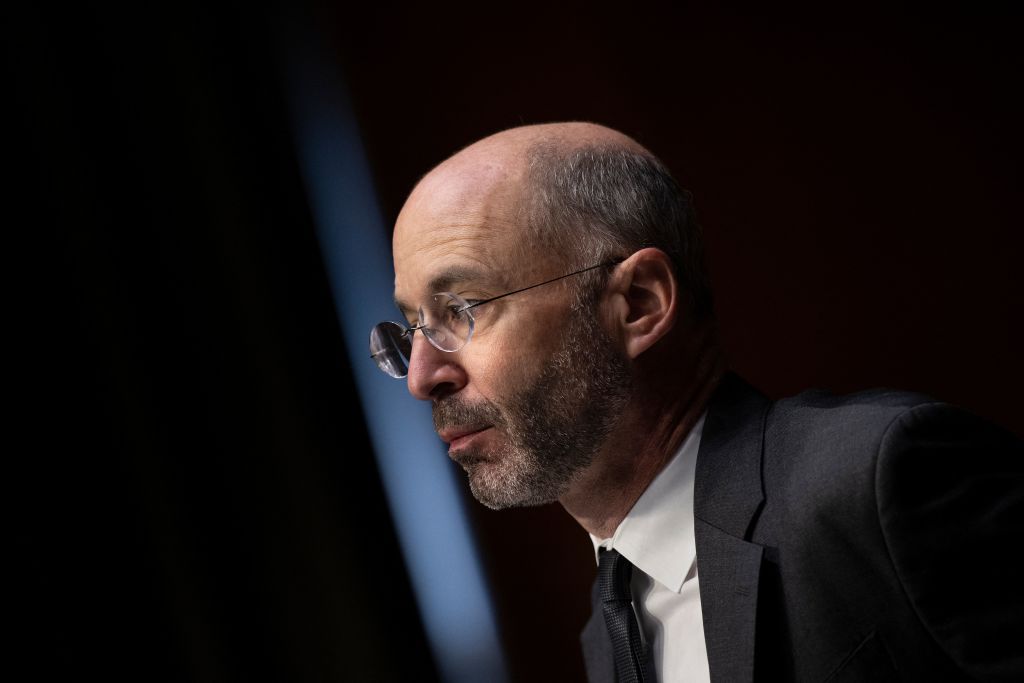Happy Monday! We hope you’re waking up and reading this in a place where the thought of going outside doesn’t fill you with existential dread.
Quick Hits: Today’s Top Stories
- The Department of Education announced Friday it plans to discharge a total of $39 billion in federal student loans in the coming weeks, “fixing” income-driven repayment plans for 804,000 borrowers to ensure an “accurate count of the number of monthly payments” those borrowers have made. Under the new rule, any month in which a borrower was in a “repayment status”—even if their payments were partial or late—will be credited toward the borrower’s repayment plan. The move comes just weeks after the Supreme Court held that the Biden administration did not have the authority to unilaterally cancel hundreds of billions of dollars of student loans, and it drew criticism from conservatives as an “unlawful plan” that will “require working American taxpayers to foot the bill.”
- Russian foreign ministry officials claimed Monday that the Ukrainian military had launched an overnight attack on the Kerch Strait Bridge, the most direct supply line between occupied Crimea and Russian military positions in southern Ukraine. The strike, which Russian officials said killed two people, follows a similar blast last October. Also on Monday, Kremlin spokesperson Dmitry Peskov said Russia had “suspended” its participation in the Black Sea Grain Initiative, brokered last year to allow Ukraine to continue grain exports to global markets. Wheat prices jumped 3.5 percent on the news.
- President Joe Biden issued an executive order last week approving the mobilization of 3,000 reserve troops who could deploy to Europe in support of Operation Atlantic Resolve. Defense Secretary Lloyd Austin has not sent any of the 3,000 reservists to Europe yet, but the move was announced as last week’s NATO summit wrapped up and comes a year after the United States deployed 20,000 troops to Europe following Russia’s invasion of Ukraine. Lt. Gen. Douglas Sims, operations director for the Joint Staff, told reporters the mobilization “reaffirms the unwavering support and commitment to the defense of NATO’s eastern flank in the wake of Russia’s illegal and unprovoked war on Ukraine.”
- In an interview with Kommersant published late last week, Russian President Vladimir Putin addressed June’s Wagner Group mutiny, claiming he offered Yevgeny Prigozhin’s mercenary fighters the opportunity to continue fighting in Ukraine under a new commander, but that Prigozhin—Wagner chief and mutiny leader—said he and his soldiers wouldn’t agree to that. The Kremlin seems to now be dismantling the private military company: Putin cryptically said it “simply doesn’t exist” even as Wagner mercenaries popped up training soldiers in Belarus over the weekend.
- The House voted 219-210 on Friday—with four Democrats in favor and four Republicans opposed—to pass a National Defense Authorization Act (NDAA) for fiscal year 2024. The $886 billion legislation—which will not become law as-is—would bar the Pentagon from paying for abortion services or providing gender-transition treatments for troops, eliminate Defense Department roles dedicated to diversity and inclusion, and create a new special inspector general for Ukraine security assistance to oversee audits of U.S. aid to the war-torn country. The Senate is currently working on its own version of the legislation, which will then need to be reconciled with the House-passed version before becoming law. National Security Adviser Jake Sullivan said Sunday the House-passed version of the bill is “never getting to the president’s desk.”
- China’s National Bureau of Statistics reported this morning the country’s gross domestic product grew just 0.8 percent quarter-over-quarter, down from 2.2 percent in Q1 2023. The Chinese economy purportedly grew 5.5 percent year-over-year, but that more respectable figure can largely be attributed to 2022’s limited growth due to rolling COVID-19 shutdowns. Youth unemployment in China also reached an all-time high in June, with more than 1 in 5 people between the ages of 16 and 24 out of a job. The data, if accurate, shows China’s economy is slowing in the face of reduced exports and consumer spending, as well as a wobbly real estate market.
- British Defense Minister Ben Wallace told the Sunday Times he plans to step down from his post within Prime Minister Rishi Sunak’s government after serving in the role for four years—and that he’ll step down from parliament after serving as an MP for nearly two decades. Wallace had sought a promotion to NATO secretary-general, but his bid was rebuffed after opposition from Biden.
- Israeli Prime Minister Benjamin Netanyahu was rushed to the emergency room at Sheba Medical Center on Saturday after experiencing mild dizziness that his office said was likely the result of dehydration. The 73-year-old was discharged from the hospital yesterday with a holter monitor, a type of portable heart monitor, a few hours after he released a video from the hospital declaring himself to be doing “very good.”
- Carlos Alcaraz, a 20-year-old Spaniard, defeated tennis legend Novak Djokovic on Sunday to win this year’s Wimbledon Championship. On the women’s side, Marketa Vondrousova of the Czech Republic defeated Ons Jabeur to become the first-ever unseeded woman to win at Wimbledon.
Where’s Malley?

There’s a clear current of frustration in the letters winging between Capitol Hill and the State Department as lawmakers seek answers about the suspended security clearance of the administration’s top Iran envoy, Rob Malley. “The Department’s failure to inform Congress of this matter demonstrates at best a lack of candor,” wrote Rep. Mike McCaul of Texas, top Republican on the House Foreign Affairs Committee. “And at worst represents deliberate and potentially unlawful misinformation.”
“The Department is not in a position to provide further documents or information related to this personnel-security clearance matter,” State Department officials wrote back, according to a letter McCaul’s office provided TMD. State cited employee privacy rules, pointing McCaul to the Department’s Foreign Affairs Manual.
Malley has been working on U.S. Middle East policy for decades. The Obama campaign dropped him after critics complained he’d met with Hezbollah members as part of his regional analysis research, but he returned to the administration to help broker the 2015 Iran nuclear deal. The Biden administration brought him back as special envoy to Iran to lead foundering attempts to revive that deal.
What’s going on with Malley now still isn’t clear. In May, he missed a classified Senate briefing on Iran, and the State Department said he was on leave but “still very much engaged on this issue.” He kept doing at least some State Department work, participating in media interviews. On June 29, CNN reported that his security clearance had been suspended amid a diplomatic security investigation concerning possible mishandling of classified information—and Semafor has since reported the FBI is also examining the case, suggesting it could be about more than a minor slip-up in handling classified papers. Malley had reportedly been on partial personal leave before the State Department placed him on unpaid full-time leave.
Neither Malley nor the State Department have said much. “I have been informed that my security clearance is under review,” Malley told multiple news outlets. “I have not been provided any further information, but I expect the investigation to be resolved favorably and soon. In the meantime, I am on leave.” Citing personnel privacy rules, the State Department won’t confirm he’s under investigation. “Rob Malley is on leave and Abram Paley is serving as acting special envoy for Iran and leading the department’s work in this area,” department spokesman Matthew Miller said in a statement.
Secretary of State Antony Blinken—who befriended Malley when they attended school in France as teenagers—defended the ousted envoy in an interview with MSNBC. “What I can say is I’ve known Rob Malley for many, many years, and he’s someone who’s dedicated his life, his career, to serving our country, and he’s done so admirably,” Blinken said. “The work that we’re doing on Iran, making sure that it doesn’t acquire a nuclear weapon, bringing home those unjustly detained, pushing back in coordination with allies and partners against its behavior in other areas—that continues.”
Republican lawmakers aren’t pleased with the State Department’’s lack of communication. McCaul said the House Foreign Affairs Committee had requested testimony from Malley multiple times since April 11, to no avail, before learning of the investigation. “Senior State Department officials informed the Committee that Special Envoy Malley was unable to testify or brief because he was on personal leave due to the illness of a close family member, for which my staff expressed sympathy,” the congressman wrote. “At no point did the Department indicate that Special Envoy Malley’s security clearance was suspended or under review, or that he was being investigated for potential misconduct.”
McCaul demanded an accounting of the reasons for the investigation of Malley, giving State until Tuesday to respond—and received in reply the letter shown to TMD, which said the department is “reviewing” his request for information about Malley’s leave status, again with an eye to privacy. The letter offered few details, which McCaul declared “absolutely unacceptable.”
“Congress deserves to know exactly why the U.S. special envoy to Iran had his security clearance suspended, was then suspended from his position, and now, according to news reports, is being investigated by the FBI,” McCaul told TMD in a statement. “This is a person whose mission is to negotiate with the Islamic Republic of Iran—nothing could be more serious than this.” He’s seeking a classified briefing this week.
Sixteen Republican lawmakers on Thursday sent another letter, this one to the State Department’s internal watchdog asking for an investigation of whether the department followed all the rules in suspending Malley’s clearance. Lawmakers asked for details on how and when Malley’s access to classified information and controlled spaces was restricted, what work he continued to perform, and why he wasn’t put on unpaid leave sooner.
Asked by The Dispatch about when Malley was notified that his clearance was suspended and when the department expects to update Congress about the investigation’s cause and results, a spokesperson confirmed Malley is on leave, confirmed Paley is leading Iran work as deputy special envoy, and said, “We have nothing further to share at this time due to privacy considerations.”
Sen. Marco Rubio, vice chair of the Select Committee on Intelligence and a signatory to the letter, criticized the administration’s handling of the situation. “You would think the administration would proactively inform Congress that the person in charge of this doesn’t have the clearances to do their job, and that never happened,” Rubio told Politico. “It’s not good.”
Some Democrats have cautiously defended Malley. “Based on my prior experience with Rob Malley, I expect he will be completely cleared,” Maryland Sen. Chris Van Hollen, a member of the Senate Foreign Relations Committee, told Politico. “I’ve always known him to be someone who’s very careful when it comes to America’s secrets.”
But Democratic Sen. Chris Coons of Delaware, a Foreign Relations Committee member, reiterated the need for a briefing—both on Malley and the state of any negotiations with Iran. “The Iranians are providing the Russians critical drones and munitions for their aggression in Ukraine,” Coons said on “Face the Nation” last Sunday. “I think that puts even greater tension on any possible conversations between the United States, our regional allies, and Iran. And I do think we need a briefing to update the members of Congress.”
Worth Your Time
- With more and more news outlets on both the left and right forgoing serious inquiry for partisan boosterism, the liberal writer Jonathan Chait penned a defense of independent opinion journalism. “When I write something critical of progressives, the most common critique I encounter is that I should instead focus on criticizing the right, because the right poses the greater danger,” he notes for New York magazine. “Conservative writers who attacked Donald Trump were met with a hail of angry declarations from Republicans that the real problem was Hillary Clinton’s perfidy or wokeness or what have you. Progressives who criticize their fellow coalition partners encounter the same response. (And this holds true of leftists who criticize liberals as well as vice versa.) I can write a dozen columns in a row attacking the right, and the next column attacking the left will predictably draw the familiar complaints that I do it too much. In practice, the appropriate level of internal criticism demanded by many activists is zero. Of course, decisions about what kinds of issues deserve opinion coverage, and in what quantity, are a perfectly reasonable thing to question. I can name several writers, almost entirely on the left, who I believe fixate too heavily on the flaws of their own side. But the correct amount of criticism of progressives or Democrats isn’t zero.”
Presented Without Comment
NBC News: RFK Jr. Pushes Back on Report He Said COVID-19 Was Ethnically Targeted to Spare Jews
Also Presented Without Comment
New York Post: “Vice President Kamala Harris on Friday called on the US to ‘reduce population’ in an effort to combat climate change, but she meant to say ‘reduce pollution,’ according to the White House.”
Also Also Presented Without Comment
Bloomberg: Zimbabwe President Signs Law That Prohibits Criticism of State
Toeing the Company Line
- In the newsletters: Jonah examines Russia’s long history of authoritarian imperialism, Harvest dives into (🔒) the latest National Defense Authorization Act vote in the House, the Dispatch Politics team wraps up presidential contenders’ Q2 fundraising numbers, Nick looks at (🔒) what Ron DeSantis’ presidential campaign hasn’t done wrong, and Chris previews (🔒) the 18 days that will decide the Republican nomination.
- On the podcasts: There’s not much of a coherent throughline connecting all the topics Jonah covered on Saturday’s Remnant, but he bounced from the latest developments in Ukraine to his newfound love of The Bear, with pit stops looking at college admissions and his disdain for filmmaker Adam McKay.
- On the site over the weekend: Thomas Koenig pans Michael Waldman’s new book on the Supreme Court and Alicia Rolsma reviews Wes Anderson’s new movie, Asteroid City.
- On the site today: Audrey B. explains the latest D.C. crime trends and John Hart looks at conservative, market-based approaches to addressing climate change.
Let Us Know
Do you agree with Jonathan Chait on the importance of “independent opinion journalism”?






Please note that we at The Dispatch hold ourselves, our work, and our commenters to a higher standard than other places on the internet. We welcome comments that foster genuine debate or discussion—including comments critical of us or our work—but responses that include ad hominem attacks on fellow Dispatch members or are intended to stoke fear and anger may be moderated.
With your membership, you only have the ability to comment on The Morning Dispatch articles. Consider upgrading to join the conversation everywhere.